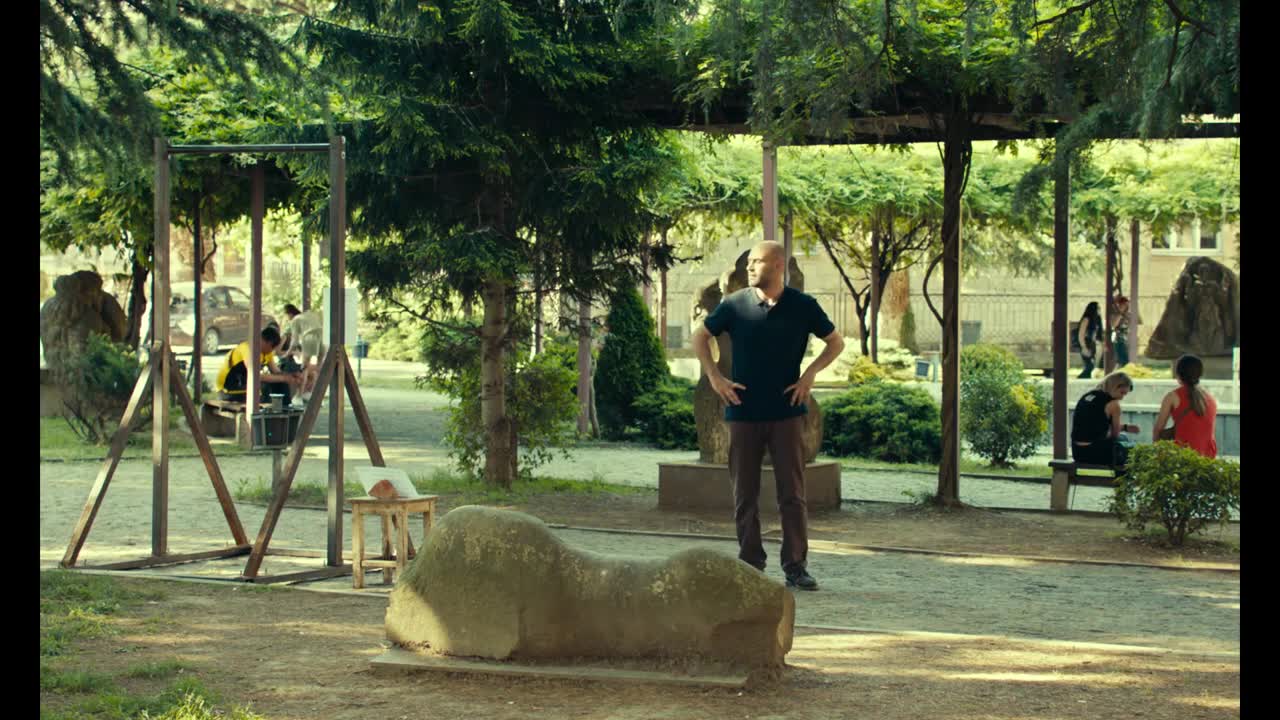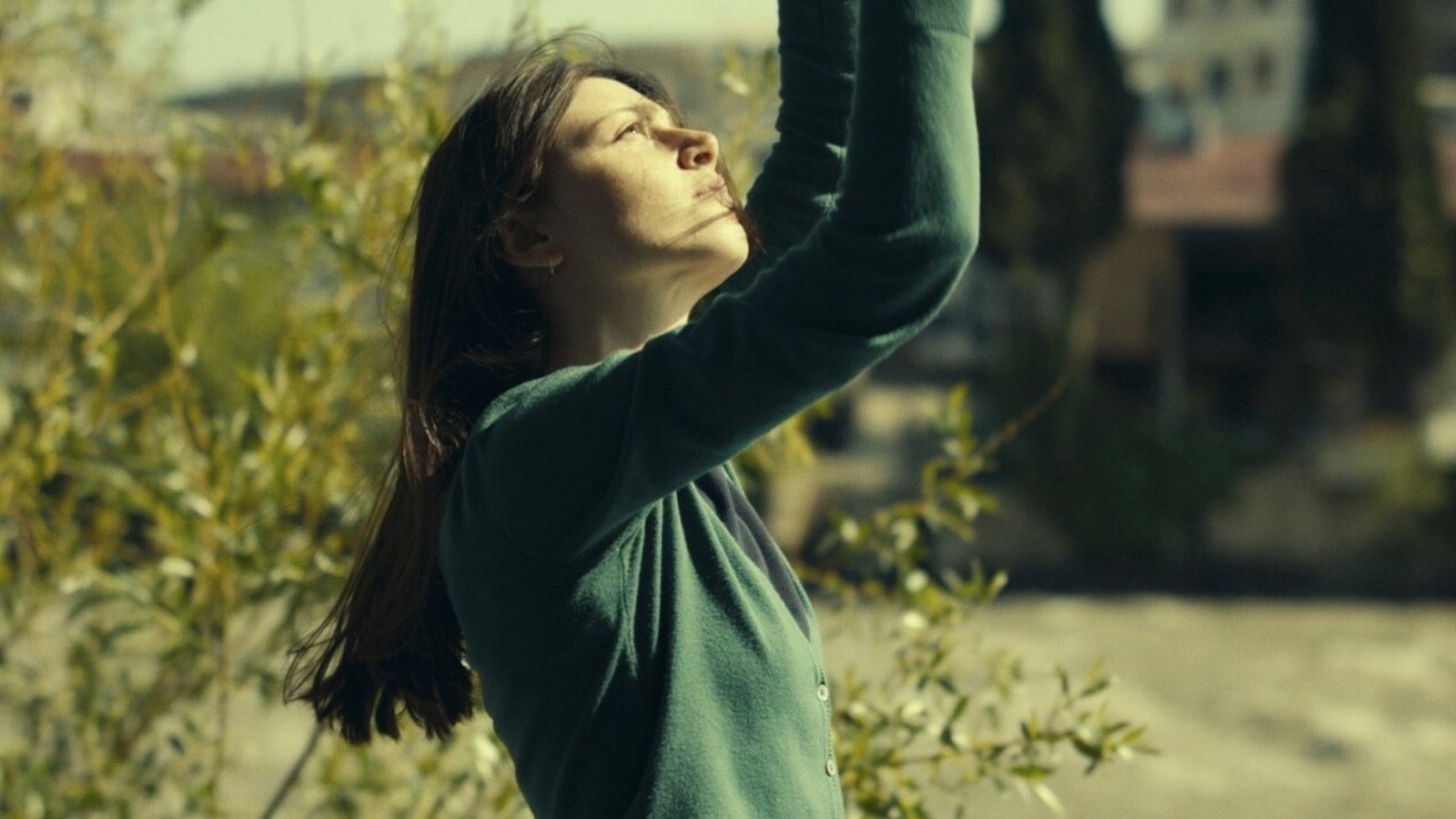What Do We See When We Look at the Sky movie review: The world is magical if you pay attention
About an hour into Alexandre Koberidze’s Georgian film What Do We See When We Look at the Sky?, I finally realised the significance of the title. The scene follows a group of kids playing football, but in slow-motion, cut to the Giorgio Moroder-composed Notti Magiche, the official song for the 1990 football world cup.
This scene is a momentary rupture in the movie’s arthouse stillness. Up until then, I had been seeing a quiet, gentle film, quirked up by a magic-realist premise that is soon left hanging like a thought bubble while the film becomes a lyrical document of Kutaisi, one of Georgia’s oldest and most populated cities.
The Mubi release begins with Lisa and Giorgi running into each other one morning. When they meet again in the evening, they make a plan to go on a date the next night. But Lisa is soon warned by a seedling, a surveillance camera, and a rain gutter that an ‘evil eye’ has cursed her. When Lisa wakes up the next day, she will find her appearance changed.
Lisa quickly leaves the place, before the wind can pass on more crucial information: Giorgi’s appearance will be changed as well, so the two prospective lovers will forever be tormented, unable to recognise each other.
The curse turns out to be real. Lisa (Ani Karseladze and Oliko Barbakadze) and Giorgi (Giorgi Ambroladze and Giorgi Bochorishvili) not only lose their faces, but also their talents. Football fan Giorgi can no longer kick the ball right. Medical student Lisa has forgotten her lessons. Hoping to meet each other somehow, Lisa takes up a job at the cafe where she was supposed to meet Giorgi. On the other hand, Giorgi starts working for a roadside gig where passers-by are offered a cash prize, if they can hang from a metal bar for two minutes. Later, I YouTubed and found that it’s an actual thing in Europe.
If this creates an impression that What Do We See When We Look at the Sky? is a twee, eccentric fantasy like Amelie, that’s not the case. Lisa and Giorgi’s track slowly becomes part of a larger whole. Koberidze turns his attention towards the setting: Kutaisi, its inhabitants, animals, culture, history, and public spaces. Holding the deliberately paced and meticulously framed film is Koberidze’s impassive voiceover.

While I couldn’t stop watching, I got impatient wondering where is this film going. I finally found an answer in the scene I mentioned at the beginning.
When we look at the sky, we are blinded by the sun, the infinite, the universe itself, and we feel miniscule, part of common humanity. The universality of that experience, and the need to see the world anew with a curious and kind gaze is what Koberidze is communicating with his movie.
For example, Faraz Fesharaki’s camera looms over the city’s many football fans, occasionally framing someone’s head, feet or face in a close-up, or sometimes moving away and observing the community as a whole, as they watch a match together. Koberidze’s voiceover provides the history of the city and its people. When the camera is turned towards the city’s dogs, Koberidze’s narration gives them names, personalities, stories. In that football-playing scene in the centre of the movie, Koberidze’s intention becomes clear. He is asking us to pay attention to the people and the world around us.
I became confident with my interpretation in the second half of the movie. The film is divided into two parts. The first part begins with a quote from Giorgian author Rezo Cheishvili’s work: “‘These morons have never seen a raven,’ Guia A thought, ‘But you couldn’t notice anything on his face.’”
The second half, which starts after that football-playing scene, begins with another quote: “Once I saw on the market of Kutaisi gioconda, she was selling herbs” from A Story Forgotten by All by Levan Chelidze.
Also read: Being the Ricardos movie review: Nicole Kidman, Javier Bardem shine in this otherwise torrid affair
Both quotes are about seeing. The first is about rebuking morons who overlook what should bring wonder. The second is about quietly observing something commonplace. In a way, Koberidze is not only alerting us about the movie’s themes, but he is also telling us how to watch the movie.
Koberidze expands a bit more on the themes in his voiceover in the second half. He speaks obliquely about the brutality of the world, and how people, such as those in his movie, or the audience, are oblivious to or unbothered about it. In that situation, what difference does his cinema make? He says while there may be bad things happening in the world, interesting things like a man and a woman losing their faces, or a group of dogs bonding over football, are happening all around us. He doesn’t know what such things mean, but he knows it is important to see and acknowledge them. What else is life and cinema about?
Movie: What Do We See When We Look at the Sky?
Cast: Ani Karseladze, Giorgi Bochorishvili, Oliko Barbakadze, Giorgi Ambroladze
Director: Alexandre Koberidze
For all the latest entertainment News Click Here

